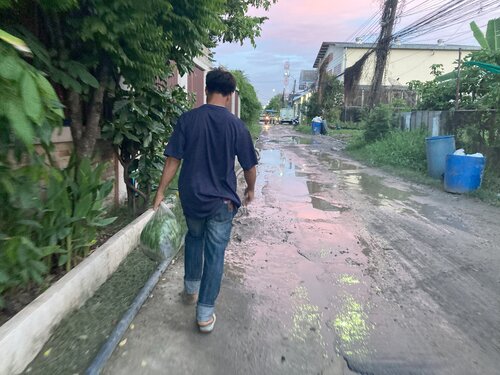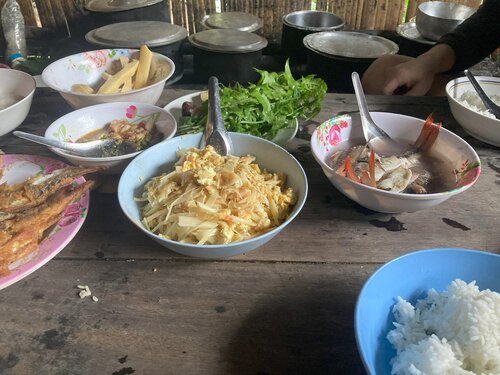- TOP
- 国際人権基準の動向
- FOCUS
- September 2025 - Volume 121
- Precarious Bang Kloi Lives, and Enforced Ethnic Enclosure Amidst the Disputed Natural World Heritage
FOCUS September 2025 Volume 121
Precarious Bang Kloi Lives, and Enforced Ethnic Enclosure Amidst the Disputed Natural World Heritage
The traditional Karen way of living relies on crop lands located in most cases in mountainous and steep areas. In this case, using fire is not an option but a must. The Karens have a system of rotation cultivation of their crop lands, ideally a seven-year period. In one year, only one crop is heavily cultivated (mainly rice) in one part of the land. The crop (such as rice) grown the year before nourishes multiple crops such as fruit trees and also tubers and beans. In the other years, rice rotation continues on other parts of the land. This system allows crops such as fruit trees to continue bearing fruits, turning into orchards, becoming fully regenerated into a forest-like land with fertile soil, and becoming ready for the return of rice cultivation years later. This type of "rotational farming" practiced by the Karen community requires only seven parts of the land to be used differently in a year. Satellite images would show only a single part as cultivated land, while the other parts are in different stages of regeneration into forest-like fallow lands.The Karens have names for each year of growing crops and making lands lie fallow.
However, this type of land use was once recognized as "unconventional" or "ineffective" by the Food and Agriculture Organization (FAO) (Luangaramsri, 2001, 2002), while Thai conservation sectors and institutions might have considered it as a threat to the unique nature of the place as depicted in the historical construction of the discourse Rai Luan Loi/Loy (Shifting Cultivation) historically used to stigmatize and marginalize the Karens as the forest destroyers (Forsyth & Walker, 2008).
Precarious Bang Kloi Lives
The Karens suffered forced relocation and questionable land allocation several times; the first time in 1995-96, then in 2010-2011 with 'Yuthhakarntenasserim' (Operation Tennaserim) involving the burning of Karen rice silo, resorted by a joint force of the Department of National Park and the military (Keawakho CrCF, 2021 and Pornphen Khongkachonkiet in this issue), and under Yutthakarnpitakphatonnampetch (Operation Tonnampetch Watershed Defense), also a joint operation of the Department of National Park and the Thai internal security sectors (military) that led to the arrest of more than forty Karens who decided to return to a place near their original homeland. They later faced criminal charges in court. These incidents violated the basic human rights of the Karens along with the loss of self-determination and cosmological perception tied to their culture of rotation cultivation as shown in this dialogue with Jor Kla on 22 July 2023:
I am here, I cannot 'Tham Rai' [cultivate land]. I could not remember the age of my youngest child anymore as when I am at Khang Bon [referring to Upper Bang Kloi] where I could cultivate, and counted my eldest son's age by that. But being here I could not count, I don't know how to... I miss my eldest child dearly as he and his younger brother have to work in Bangkok, and I am so sick that I could not work hard anymore. And I don't know how much longer I could keep on.
Jor Kla reflected on his grievances after more than a year of exhaustive travelling to attend hearings on court charges of "encroachment" under multiple conservation laws effective in 2021. He did not know how to count years the way urban people do (due to his language difficulty and low education level).
Jor Kla's eldest son (18 years old in 2023), like members of many Bang Kloi families, had to move to Bangkok to find a job. He had to endure double difficulties as an ethnic person and a laborer by suffering cuts in wages and other forms of exploitation. His younger brother came with him to Bangkok. If Jor Kla's family had not been dislocated, both of his sons would work to put food on the family table by sowing seeds and chasing off birds that would come to their crops, or even learn from their parents and the Karen people about the culture of their way of life. As in any agriculture-based society, everyone in the family contributes to the family's production.
A bag of vegetables from Jor Kla being delivered to his oldest son in Bangkok (July 2023).
On the relocation site of the Bang Kloi community,
"It was not everyone that received the land allocation, my mother said they have us draw the lots for the land" - 'La Poh Po', A Bang Kloi youth leader interviewed on 17 March 2021 whose mother passed away in 2023 due to the delayed dengue treatment.
"The new allocated lands are unsuitable for cultivation, where the soil is composed of rocks, and gravel and unable to grow the highland rice." - 'Por Kwa Sokarmor', a Bang Kloi Human Rights Defender, interviewed on 17 March 2021.
Another Bang Kloi youth, Phi Be Kwae, decided to become a waitress in Bangkok to support her mother, who was charged in 2021 with a criminal offense related to the forest.
Other members of her family avail of jobs in Bang Kloi under a royal initiative foundation such as her mother who make handicrafts. But the income from this job could not sustain her family:
"The wage, (my mother got) from sewing is just 170 THB a day, and it's been 3 months without getting paid"- Phi Be Kwae and her mother on 26 November 2022
"The raft if my father could get it running would generate an income of around 400 THB, but finding bamboo nowadays [to make the raft] is difficult, and tourists usually come with someone appointed to do rafting." Phi Be Kwae and her Father on 26 November 2022
Meal with Phi Be Kwae's family (November 2022).
The Bang Kloi people were evicted by force and re-settled in a place where another community resides and with whom they have to compete for the limited resources available that creates conflicts between them. As a result, they were stripped of the rights to self-determination and to their own ways of living. This situation reduced their socio-cultural dignity and limited their economic capabilities, leading to the risk of losing their Karen cultural heritage.
Being treated as criminals (forest encroachers) even though they have lived in this forest for generations before it was named Kaeng Krachan Forest Complex (KKFC) makes them vulnerable and exposes them to more marginalization within Thai society. The memory of delayed justice for the enforced disappearance of a Bang Kloi leader led to a state of fear that living in a remote area would not make the law protect them.
Concluding Remarks
The underlying causes of the problems of the Bang Koi community have been highlighted by many civil society organizations as well as activists, such as the notable #SaveBangKloi aliances (ภาคีSaveบางกลอย in Thai). While Thailand has declared to comply with all relevant United Nations declarations (such as the Universal Declaration of Human Rights and the United Nations Declaration on the Rights of Indigenous Peoples) their implementation at the national level has always been problematic. As shown by a Thai bureaucrat who described the Bang Kloi issue in 2021 as follows:
"First of all, I would like to say that in Thailand we don't have 'Chon Phao Peun Mueang' (indigenous people). Our country only has those who resided within Thai Land, some might be confused with the terms, .... But I would ensure that there are no IPs [Indigenous Peoples], after all these centuries, nowadays we might have what are called 'ethnic people' who after having inhabited Thailand, are Thais, even with different backgrounds...."
".... So, the terms between Indigenous and local people differ, such as in Australia, they have the aboriginal people, whilst in America they have the Native Americans. But, here in Thailand, Thai people have settled down generations ago, until the people like the Karens and other ethnics 'moved in' so then they have become 'the locals' not the indigenous. The term indigenous must only apply if they have lived there in Kaeng Krachan before Siam, but in that area, like 200-300 years I am sure, no one lived there, therefore, they are not indigenous people" - Warawut Silparcha, Minister of the Ministry of Natural Resources and Environment, interviewed by GreenNews (กรีนนิวส์, 2021) on 28 July 2021, after KKFC had become WHS.
Though Thailand has recently enacted the law entitled Act on the Protection and Promotion of the Way of Life of Ethnic Groups (2025), few of the core principles such as the self-determination and concept of cultural territories originally proposed by civil society organizations, academics, and other parties have been incorporated in Thai law.
This means continued advocacy to protect the rights of ethnic communities including participatory management of KFFC, working closely with the National Human Rights Commission of Thailand in addressing human rights issues (such as those related to UNDRIP), the development of pilot projects, and reconciliation of the community's economic, social, cultural, and spiritual needs with the KFFC. As one Karen puts it
"Our people are not against the Natural World Heritage idea. But the government knows that the Karen live peacefully in their area and yet they were not consulted before making the registration with UNESCO (Por Kwa Sokamor, interviewed July 2023).
With the precarious state of Bang Kloi people as a community and precarity as individuals, caused by the so-called "Green Militarization," the return to their original homeland (Jai Phan Din/Bang Kloi Bon) is unclear. Nevertheless, this is an opportunity to rethink of the idea of World Heritage Site as referring only to "Natural Character" of a place while ignoring the intangible aspects of the Kaeng Krachan Karens' cultural heritage, including their world view of themselves being part of nature. As some of them said
"Our father and mother told us that when we were born, the things surrounding the place where we were born were the best that we could nurture ourselves from." Phue, the current Bang Kloi Spiritual leader said in March 2021.
"I thought, the word 'Tham ma chat' (Nature) was also including myself as my people, and aren't we all 'Born from Nature'?" Jor Tami Yor, Bang Kloi Karen spokesperson interviewed 25 November 2022.
It is time to reconsider, especially in the current time of multiple crises propagated by expanding commoditization, the meaning of "conservation of nature," and how we perceive ourselves existing with this decaying nature and cultures. We need to consider what Karen believes strongly, we are born from nature.
Jarik Krobtong is a graduate of forestry and an independent worker, who has been involved in the Thai land-forest social movements/civil society during his ethnographic journey for a social science masters degree in Chiangmai University which led him to Bang Kloi.
For further information, please contact: Jarik Krobtong e-mail: jarik.pilgrims@gmail.com; https://independent.academia.edu/JarikKrobtong.
References
Forsyth, T., & Walker, A. 2008. Forest Guardians, Forest Destroyers: The Politics of Environmental Knowledge in Northern Thailand. University of Washington Press. https://silkwormbooks.com/products/forest-guardians-forest-destroyers.
Keawakho, A. 2021. Timeline: The Plight of the Karen Indigenous Peoples of Bang Kloi, CrCF, https://crcfthailand.org/en/2021/03/17/15538/.
Laungaramsri, P. 2002. "On the Politics of Nature Conservation in Thailand," Kyoto Review of Southeast Asia, https://kyotoreview.org/issue-2-disaster-and-rehabilitation/on-the-politics-of-nature-conservation-in-thailand/.
Laungaramsri, Pinkaew. 2001. Redefining Nature: Karen Ecological Knowledge and the Challenge to the Modern Conservation Paradigm. Vol. 1, Earthworm Books.
กรีนนิวส์. 2021. สัมภาษณ์พิเศษ "วราวุธ ศิลปอาชา" หลังมติแก่งกระจานเป็นมรดกโลก, https://greennews.agency/?p=24676.


